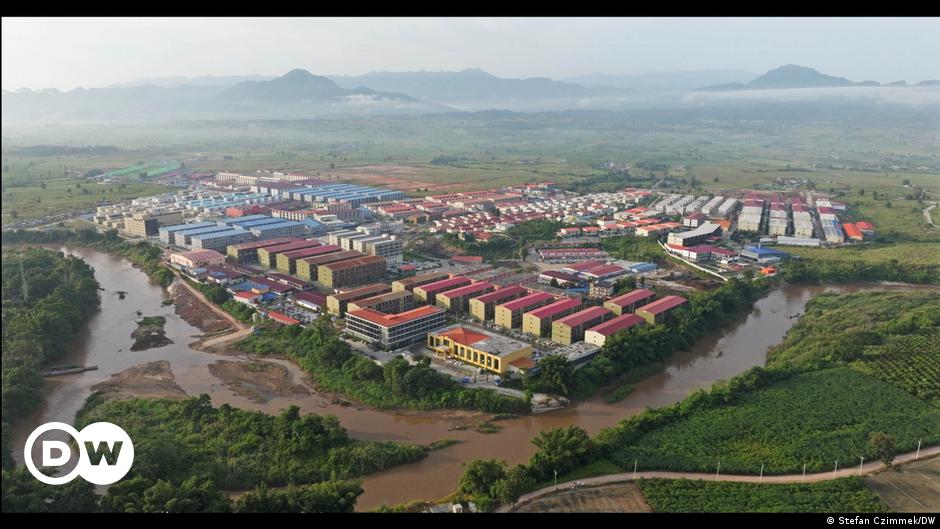Aaron couldn't believe his luck. A startup tech company in Thailand is offering him a dream job: high pay, great benefits, and a way out of southern Africa's bleak future.
“I wanted to go abroad and work, and one day I was approached,” Aaron said. “I thought everything was legal until I got to Bangkok.”
At the airport, Aaron received a warm welcome and was led into a car with two other young people from East Africa.
“We were supposed to go to a hotel that was probably 10 minutes away from the airport, but we ended up driving in the wrong direction.”
The driver drove for nearly eight hours to reach the Thai border city of Mae Sot, where Aaron and his companions were trafficked across the Moei River to a war-torn region of Myanmar.
“There were people with guns,” he recalled. “They said we should take a boat, so we crossed.”
human trafficking crisis
Aaron and his friends were trafficked to a prison-like facility called KK Park. Here, thousands of people are forced to commit criminal acts to defraud people in the United States, Europe, and China. The United Nations estimates that more than 100,000 people are forced to work in Myanmar's fraud centers.
DW's investigative unit met with several survivors at the compound. They described widespread surveillance, torture, and even weekly murders.
“We worked 17 hours a day, no complaints, no holidays, no days off,” said Lucas, a young man from West Africa. “And when we say we want to leave, they say sell us or kill us.”
But who is behind this brutal operation?
local enabler
We saw exclusive images taken from the compound and spoke to several survivors held there. They all recognized the badge on the security guard's uniform.
These are the insignia of the official Border Patrol, a group of former rebels who stopped fighting Myanmar's military junta in exchange for free control of the territory a decade ago.
Their soldiers are in KK Park. However, sources say the person in charge of the operation is Chinese.
Cryptocurrency tracking
We followed the trail of money from several fraud victims to see where it ended up. We went to the cryptocurrency wallet that KK Park was using to collect the victims' funds. From there, funds were sent to other wallets that functioned like digital accounts and stored cryptocurrencies.
One of those wallets was opened by Wang Yi Cheng, a Chinese businessman based in Thailand. He received tens of millions of dollars worth of cryptocurrency from a wallet used by KK Park.
Mr. Wang is part of a larger network of overseas Chinese businessmen that ultimately connect to notorious Chinese mafia bosses.
At the time Mr. Wang received the money directly from wallets controlled by KK, he was vice president of the Thailand-Asia Economic Exchange Association, a Bangkok-based association promoting relations between China and Thailand.
Thailand Asia shares a building with the Overseas Hongmen Cultural Exchange Center, which along with another Hongmen Center in Bangkok was arrested by police in 2023 for allegedly operating illegally and serving as a front for Chinese organized crime. was subjected to a forced search.
crime boss
These organizations are closely affiliated with Wang Quoc Koi (also known as Broken Tooth). He founded the World Hongmen History and Culture Association in 2018, which has been sanctioned by the United States for its involvement in organized crime.
But Wan's Hongmen organization also promotes Beijing's ambitious Belt and Road Initiative (BRI), a multitrillion-dollar infrastructure project aimed at further integrating China into the global economy. Also known as the New Silk Road.
Jason Tower, a leading expert on organized crime at the U.S. Institute of Peace, said: “Wan Kuok Khoi also has a quote he uses quite often: He used to fight for the cartels, but now he's fighting for the Chinese Communist Party.'' “He says he is fighting for it.” he told DW.
The area where KK Park was built is a target area for China's Belt and Road investment. The Chinese government reportedly welcomed the development project around KK Park as part of its One Belt, One Road ambitions, but later distanced itself from the development project following widespread fraud allegations.
KK Park itself is not mentioned in official Chinese communications, nor has a groundbreaking ceremony been held like other development projects in the region.
Instead, KK Park was created for fraud.
Expand your network
KK Park's fraud can be traced back to a complex network of companies and entities used by criminals to justify their crimes and launder millions in fraudulent assets. And its network continues to expand from Southeast Asia to Africa, Europe, and North America.
“What we really see is that these criminal networks are becoming more and more powerful, more and more influential, and more and more embedded in different countries around the world,” Tower said.
“And efforts by law enforcement are just the tip of the iceberg.”
Learn more in the documentary Fraud Factory: Behind the Scenes of Cyber Slavery in Asia..
Aaron, Lucas, and Laura's names have been changed for security reasons.
Edited by Matthias Behringer.

